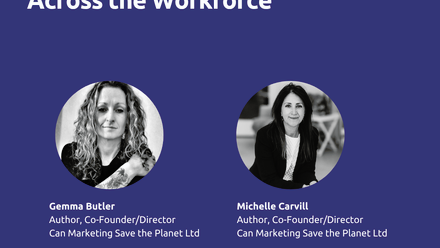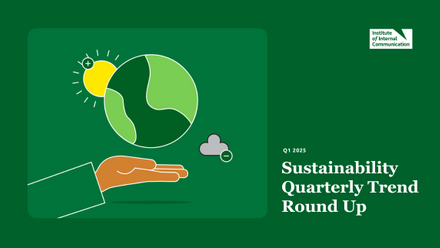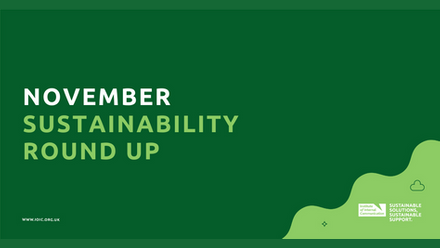At the IoIC, we believe everyone has a moral imperative to reduce consumption and carbon emissions, to protect our planet for future generations.
We also believe there’s a huge opportunity for internal communicators to kick-start and facilitate carbon conversations at work, engaging as many people as possible in the journey towards net-zero business.
With the above in mind, here are some sustainability new items that have caught our eye this month.
Community sustainability
Shane Price is the founder of Green Circle Salons, a sustainable salon community dedicated to fighting beauty waste and climate change. When he initially set this up, he had an ambitious goal in his sights: to recover 5,000 tons of waste created in beauty and hair salons.
He reached that goal this year, thanks to the millions of small but meaningful daily actions his community of North American “waste warriors” has taken.
As sustainability targets become a more and more prevalent business imperative, he shares his tips for overcoming common challenges to help turn net zero pledges into actionable progress:
Level set. Quantify goals. Start small. Join forces.
But it’s the fifth nugget of advice that really resonates with us – communicate consistently. If what we’re doing by the environment is important, so is how we share it. As he says:
“If you reach a goal, share it broadly. If you have encouraging metrics, be loud and proud about them. If you fall short, share that also – along with a pledge to keep moving forward.”
Organisational sustainability
Granted, it may not be something we – especially in the UK – think about very often as part of our day-to-day work activities, but increasingly we’re likely to come across a key question that may be of great future significance for us all:
Just how ready are our businesses and organisations for emergencies triggered by the impacts of climate change?
Business leaders can prepare their workforce by following four key steps outlined in this Fast Company article by Diane Osgood, a sustainability consultant and co-author of The Carbon Almanac.
As IC professionals, we have a pivotal part to play in crisis communication within our organisations, of course, so if there’s one key action point we should take away from this insightful piece, it’s this:
“Have a plan for emergencies and communicate it to employees. Employees want to know there is a plan.”
Economic sustainability
Business leaders are increasingly appreciating the degree to which their environmental, social and governance (ESG) practices are more than mere “nice-to-have” investment strategies.
In a global economy that’s shifting to greener technologies, the intersection of sustainability and profitability is coming into clearer focus. It’s saving companies money to reduce their physical and carbon footprint.
Larry Fink, the head of BlackRock, the world’s largest investment firm that manages $8 trillion assets, wrote in a recent letter to CEOs that his business focuses on sustainability, “not because we’re environmentalists, but because we are capitalists and fiduciaries to our clients.”
A shame, you could argue, that he’s motivated more by balance sheets than by making the planet a safer place for future generations, but nevertheless, it’s significant that Mr. Fink appreciates the degree to which the transition to a net-zero world represents a once-in-a-lifetime investment opportunity.
In this article, academic philosopher turned tech writer Dr. Justin Morris shares his thoughts on what we can leverage to help our organisations meet their sustainability objectives.
In the IC community, we’re well-placed to take some of these on-board and help our colleagues with the next steps to turning sustainability into competitive advantage.
Environmental sustainability
From an environmental standpoint, 2023 will be remembered as something of a tipping point.
The environment and sustainability are now centre stage, making this the year businesses and organisations were no longer able to put their heads in the sand over the climate emergency.
Here are the year’s five key environmental trend take-aways for organisations, according to Raconteur:
- We can no longer ignore the climate crisis
- We need to prepare for new carbon reporting requirements
- New regulations on commercial properties will put focus on sustainability and biodiversity
- Inflation is affecting sustainable choices
- Greenwashing and the crackdown on misleading environmental claims are intensifying
Read more about each of these here.
Personal sustainability
People who work remotely all the time produce less than half the greenhouse gas emissions of office workers, according to a new US study by Cornell University and Microsoft.
Workers based at home all the time reduce their emissions by about 54%, compared with full-time office-workers, the research found.
Unsurprisingly, hybrid workers do not reduce their emissions so dramatically. One day a week of remote working cuts emissions by just 2%, because energy savings from not being in the office are offset by factors such as an increase in non-commuting travel when working from home.
Working remotely two to four days a week reduces an individual’s emissions by between 11% and 29%, when compared with on-site workers.
The study found that IT and communications technology have a negligible impact on individuals’ work carbon footprints. The principal causes of remote workers’ reduced emissions are less office energy use, as well as fewer emissions from a daily commute.
The study provides useful pointers on how office-based employers can reduce company emissions – all helpful stuff when it comes to bringing along our colleagues on our journey to do the right thing by both the environment and our organisations.
IoIC Awards 2026
Find out everything you need to know with our entry guidance including top tips to help your submission stand out. Early Bird Entries must be submitted by 11.59pm on Friday 13 February and Standard Entries submitted by 11.59pm on Friday 17 April.Latest Podcast: Nurturing inclusive work cultures
In this bonus episode of season 14, Jen, Dom and Cat are interviewed by IoIC board member and fellow Joe Salmon. Together they discuss the factors driving change for internal communication and ways in which internal communicators can prepare for an altogether exciting future.







